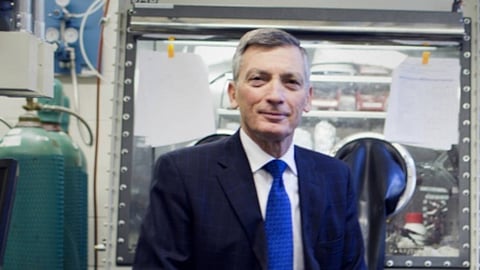As the world is moving towards renewable energy, the most sought-after facility is of storage. The lithium-ion batteries which are used now are too expensive for most applications, and often have the risk of catching fire.
Now, researchers at MIT and elsewhere have developed a new kind of battery, made entirely from abundant and inexpensive materials, that could help to fill that gap.
The researchers at MIT, led by Prof Donald Sadoway, have developed a low-cost and less risky battery using aluminium and sulphur as its two electrode materials, with a molten salt electrolyte in between.
“I wanted to invent something that was better, much better, than lithium-ion batteries for small-scale stationary storage, and ultimately for automotive [uses],” explains Sadoway, who is the John F. Elliott Professor Emeritus of Materials Chemistry, in the journal Nature.
In addition to being expensive, lithium-ion batteries contain a flammable electrolyte, making them less than ideal for transportation. So, Sadoway started studying the periodic table, looking for cheap, Earth-abundant metals that might be able to substitute for lithium. The commercially dominant metal, iron, doesn't have the right electrochemical properties for an efficient battery, he says.
But the second-most-abundant metal in the marketplace — and actually the most abundant metal on Earth — is aluminium. “So, I said, well, let's just make that a bookend. It's gonna be aluminium," he says.
The cheapest of all the non-metals is sulphur, so that became the second electrode material. As for the electrolyte, "we were not going to use the volatile, flammable organic liquids" that have sometimes led to dangerous fires in cars and other applications of lithium-ion batteries, Sadoway says.
They tried some polymers but ended up looking at a variety of molten salts that have relatively low melting points. “Once you get down to near body temperature, it becomes practical" to make batteries that don't require special insulation and anticorrosion measures, he says.
The three ingredients they ended up with are cheap and readily available. “The ingredients are cheap, and the thing is safe — it cannot burn,” Sadoway says.
The battery requires no external heat source to maintain its operating temperature. The heat is naturally produced electrochemically by the charging and discharging of the battery. "As you charge, you generate heat, and that keeps the salt from freezing. And then, when you discharge, it also generates heat," Sadoway says.
The smaller scale of the aluminium-sulphur batteries would also make them practical for uses such as electric vehicle charging stations, Sadoway says. He points out that when electric vehicles become common enough on the roads that several cars want to charge up at once, as happens today with gasoline fuel pumps, "if you try to do that with batteries and you want rapid charging, the amperages are just so high that we don't have that amount of amperage in the line that feeds the facility." So having a battery system such as this to store power and then release it quickly when needed could eliminate the need for installing expensive new power lines to serve these chargers.
The new technology is already the basis for a new spinoff company called Avanti, which has licensed the patents to the system, co-founded by Sadoway and Luis Ortiz '96 ScD '00. "The first order of business for the company is to demonstrate that it works at scale," Sadoway says, and then subject it to a series of stress tests, including running through hundreds of charging cycles.
Would a battery based on sulphur run the risk of producing the foul odours associated with some forms of sulphur? Not a chance, Sadoway says. "The rotten-egg smell is in the gas, hydrogen sulphide. This is elemental sulphur, and it's going to be enclosed inside the cells." If you were to try to open up a lithium-ion cell in your kitchen, he says (and please don't try this at home!), "the moisture in the air would react and you'd start generating all sorts of foul gases as well. These are legitimate questions, but the battery is sealed, it's not an open vessel. So, I wouldn't be concerned about that."

